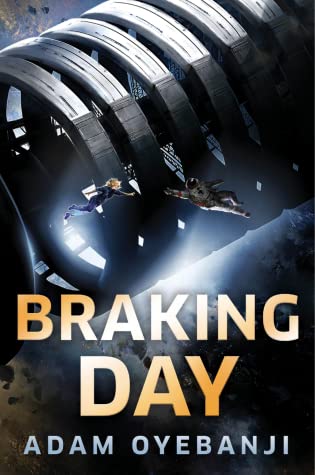 Braking Day by Adam Oyebanji
Braking Day by Adam Oyebanji Format: eARC
Source: supplied by publisher via NetGalley
Formats available: hardcover, paperback, ebook, audiobook
Genres: mystery, science fiction, space opera, thriller
Pages: 359
Published by DAW Books on April 5, 2022
Purchasing Info: Author's Website, Publisher's Website, Amazon, Barnes & Noble, Kobo, Bookshop.org, Better World Books
Goodreads
On a generation ship bound for a distant star, one engineer-in-training must discover the secrets at the heart of the voyage in this new sci-fi novel.
It's been over a century since three generation ships escaped an Earth dominated by artificial intelligence in pursuit of a life on a distant planet orbiting Tau Ceti. Now, it's nearly Braking Day, when the ships will begin their long-awaited descent to their new home.
Born on the lower decks of the Archimedes, Ravi Macleod is an engineer-in-training, set to be the first of his family to become an officer in the stratified hierarchy aboard the ship. While on a routine inspection, Ravi sees the impossible: a young woman floating, helmetless, out in space. And he's the only one who can see her.
As his visions of the girl grow more frequent, Ravi is faced with a choice: secure his family's place among the elite members of Archimedes' crew or risk it all by pursuing the mystery of the floating girl. With the help of his cousin, Boz, and her illegally constructed AI, Ravi must investigate the source of these strange visions and uncovers the truth of the Archimedes' departure from Earth before Braking Day arrives and changes everything about life as they know it.
My Review:
This debut science fiction thriller combines both “We have met the enemy and he is us” with “No matter where you go, there you are” into a story about the baggage that we literally carry with us as we attempt to make a seemingly fresh, new start.
Three colony ships, the Archimedes, the Bohr, and the Chandrasekhar, have been traveling through the black of interstellar space for 132 years. That’s seven generations of shipboard life, all in service of a single goal – reaching Destination World and disembarking for a return to planet bound life that is otherwise so far in the past that no one alive remembers any sense of gravity other than that generated by the gigantic revolving rings that make up their ships.
But all of that is about to change when we first meet Midshipman Ravi MacLeod aboard the Archimedes. Because Braking Day is only weeks away. On that day, the ship will fire up its main engines to start their final push for their new home.
When everything that has become familiar over so many decades of shipboard life will finally change.
But there are always plenty of people who prefer the status quo, and that’s just as true aboard the Archie and her sister ships as it is in any other gathering of humans. Some are just afraid. Some don’t want to take the chance of screwing up a pristine new world the same way that their ancestors – meaning us, now – made a mess of Earth.
And some, the privileged few of the officer class in particular, are not looking forward to the loss of their purpose or especially those much vaunted privileges. After all, a planetary colony won’t need an officer class to run things anymore. At least it won’t need the same people and skills in that officer class that it has needed while aboard.
First, however, Archie and her sister ships have to get there. The crew has always been told that there’s no one out there to stop them – except their own internal squabbles. And not that they don’t have plenty of those to be going on with.
But as operations gear up for Braking Day, engineer-in-training Ravi and his hacker-extraordinaire cousin Boz hack their way into secrets that no one was ever supposed to find.
Archie, Bohr and Chandrasekhar are not alone – and never have been. The officers have a plan for dealing with the threat that they’ve never officially acknowledged. The problem is that the so-called enemy has a plan to deal with them, too.
And Ravi and Boz are caught right in the middle of it.
Escape Rating A+: This was another reread for me, from another STARRED Library Journal review. So I went back to this after several months and, like The Bruising of Qilwa yesterday, it was every bit as good the second time around. I don’t have the opportunity to reread terribly often these days, so this was kind of a treat!
I got caught up in this right away, both times, because this complex story in this large, artificial ecosystem is anchored in one, multi-faceted character, Ravi MacLeod. From one perspective, Braking Day can be seen as Ravi’s coming-of-age story. When we first meet him, he’s a cadet in engineering, but that’s just the tip of a ship-sized iceberg. And from another, it’s a gigantic mystery with potentially deadly consequences. Certainly for Ravi, and quite possibly for everyone else as well.
After 132 years, the social stratification of shipboard life has reached the level of downright ossification. Children of officers become privileged officers in their turn. Children of crew become crew. Children of criminal lowlifes eventually get recycled (literally) as “Dead Weight”, just like their parents.
Ravi is a maverick who gets punished at pretty much every turn because he comes from a criminal family. He doesn’t “belong” to the officer class and few people on either side of that divide ever let him forget it. (If this part of the story sounds interesting, take a look at Medusa Uploaded by Emily Devenport, which shows what happens after century upon century of such ossification. It’s not pretty but it is compelling.)
There’s also a gigantic secret hidden in the history of the Archie’s expedition – as there was in David Ramirez’ The Forever Watch. It’s a secret that was born out of the same kind of fear and that results in the same deadly consequences.
There is also an enemy within Archie, in a place and position that all the powers that be refuse to even look at. It’s an issue that has more resonance to today than I originally saw. The privileged classes, the officers, don’t want to lose their power and privilege, and fear the changes that landfall will bring. Some of them don’t care that if they don’t land that eventually the ship’s recycling will fail and they’ll end up drifting in space. After all, it won’t happen in their generation. But the officers who are investigating the increasing incidents of sabotage never look among “their own” for the perpetrators.
Add in an actual, living, breathing enemy that has been raised for generations to hate everything about the Archie and her sister ships, that wants nothing more than revenge for past wrongs, and you have multiple recipes for disaster all playing out at the same time – a disaster that just keeps on getting bigger and having more facets every minute.
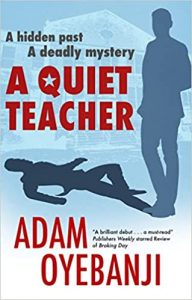 The question of whether the fleet will cripple itself, whether they and their old enemy will wipe each other out, or whether the cybernetic space dragons will decide that they are all collectively too stupid to live creates the kind of non-stop adventure that will keep readers on the edge of their seats even after the big, explosive climax.
The question of whether the fleet will cripple itself, whether they and their old enemy will wipe each other out, or whether the cybernetic space dragons will decide that they are all collectively too stupid to live creates the kind of non-stop adventure that will keep readers on the edge of their seats even after the big, explosive climax.
Braking Day was the author’s debut novel, and it was wild and marvelous and thoughtful all at the same time. I literally gobbled it up not once but twice and still wished there were more. His next book is a complete surprise as it’s a contemporary mystery thriller. A Quiet Teacher is coming out next week, and I’m terribly curious to see where the author takes me next.

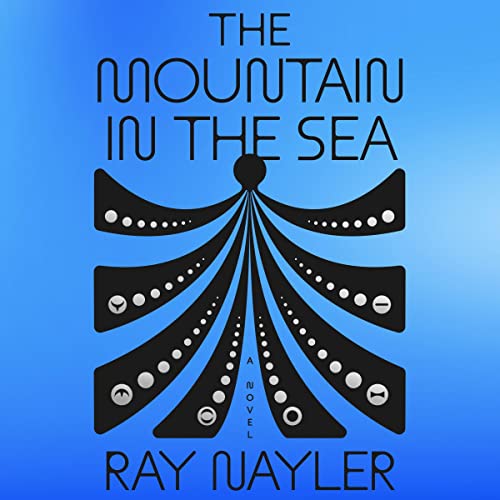 The Mountain in the Sea by
The Mountain in the Sea by  In the waters off Con Dau, DIANIMA Corporation has discovered a pod of octopuses that might, just possibly, have achieved not just a similar level of intelligence to humans, but have also independently developed the skills that vaulted humans to the top of the food chain. DIANIMA has brought Dr. Ha Nguyen to Con Dau because she quite literally wrote the book on the possibility of intelligent, communicating life developing in the world’s oceans.
In the waters off Con Dau, DIANIMA Corporation has discovered a pod of octopuses that might, just possibly, have achieved not just a similar level of intelligence to humans, but have also independently developed the skills that vaulted humans to the top of the food chain. DIANIMA has brought Dr. Ha Nguyen to Con Dau because she quite literally wrote the book on the possibility of intelligent, communicating life developing in the world’s oceans.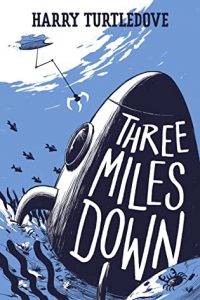 So what this story does, and does well, is to convey just the smallest sliver of how difficult it will be to find common ground with a species that doesn’t communicate the way we do, doesn’t have the same species imperatives, doesn’t move through its world the way we do, doesn’t use any body language we recognize. There’s not going to be the equivalent of the Rosetta Stone. It’s Dr. Ha Nguyen’s job to create one from scratch, while never being certain that her interpretation is anywhere near the correct target – let alone hitting a ‘bull’s eye’. If her base assumptions are off base, everything that follows after will be gibberish – with potentially catastrophic consequences.
So what this story does, and does well, is to convey just the smallest sliver of how difficult it will be to find common ground with a species that doesn’t communicate the way we do, doesn’t have the same species imperatives, doesn’t move through its world the way we do, doesn’t use any body language we recognize. There’s not going to be the equivalent of the Rosetta Stone. It’s Dr. Ha Nguyen’s job to create one from scratch, while never being certain that her interpretation is anywhere near the correct target – let alone hitting a ‘bull’s eye’. If her base assumptions are off base, everything that follows after will be gibberish – with potentially catastrophic consequences.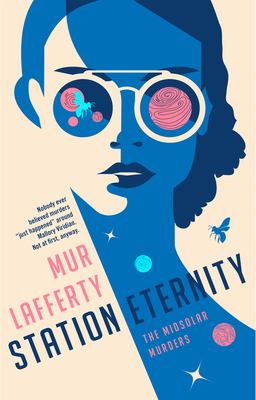 Station Eternity (The Midsolar Murders, #1) by
Station Eternity (The Midsolar Murders, #1) by  Travel by Bullet (The Dispatcher #3) by
Travel by Bullet (The Dispatcher #3) by  I’ve always assumed that
I’ve always assumed that  Escape Rating A: The author of The Dispatcher series is best known for two things, his science fiction and his excellent line in snark. Travel by Bullet, and the entire series so far, has a whole lot more of the latter than the former.
Escape Rating A: The author of The Dispatcher series is best known for two things, his science fiction and his excellent line in snark. Travel by Bullet, and the entire series so far, has a whole lot more of the latter than the former. No Man's Land (Star Trek: Picard) by
No Man's Land (Star Trek: Picard) by  1632 (Ring of Fire #1) by
1632 (Ring of Fire #1) by  The wedding reception also created a rather convenient excuse for a lot of people to be in this small and already dying town than would have been true on a typical Sunday. It is particularly notable that the only black people in town – a much needed doctor and his paramedic daughter – are only there for the wedding. Otherwise the town would be almost entirely monochromatic.
The wedding reception also created a rather convenient excuse for a lot of people to be in this small and already dying town than would have been true on a typical Sunday. It is particularly notable that the only black people in town – a much needed doctor and his paramedic daughter – are only there for the wedding. Otherwise the town would be almost entirely monochromatic. So I had fun. I had a lot of thoughts re-reading this book, but I also had a lot of fun. Even if things were a lot easier than I expect they would have been or should have been, I enjoyed watching these highly competent people doing their best to not just survive but to make a real life for themselves, their neighbors AND their posterity in a place where none of them could ever have expected to be.
So I had fun. I had a lot of thoughts re-reading this book, but I also had a lot of fun. Even if things were a lot easier than I expect they would have been or should have been, I enjoyed watching these highly competent people doing their best to not just survive but to make a real life for themselves, their neighbors AND their posterity in a place where none of them could ever have expected to be.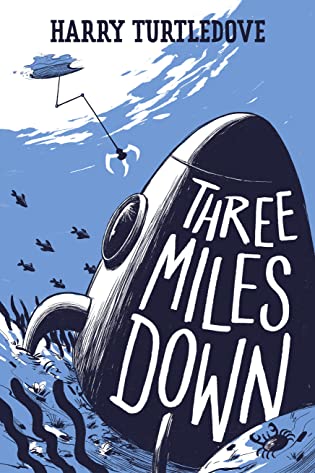 Three Miles Down: A Novel of First Contact in the Tumultuous 1970s by
Three Miles Down: A Novel of First Contact in the Tumultuous 1970s by  A Prayer for the Crown-Shy (Monk & Robot, #2) by
A Prayer for the Crown-Shy (Monk & Robot, #2) by  Crown shyness is a real-world phenomenon. About trees. Which is totally fitting for this story that features two people – even though one of them doesn’t refer to itself as “people” – who are exploring both friendship and all the myriad wonders of their world together.
Crown shyness is a real-world phenomenon. About trees. Which is totally fitting for this story that features two people – even though one of them doesn’t refer to itself as “people” – who are exploring both friendship and all the myriad wonders of their world together. Escape Rating A: If you’re looking for a story that will shed some light into the darkness, just as those crown-shy trees let light through to the forest floor, read
Escape Rating A: If you’re looking for a story that will shed some light into the darkness, just as those crown-shy trees let light through to the forest floor, read 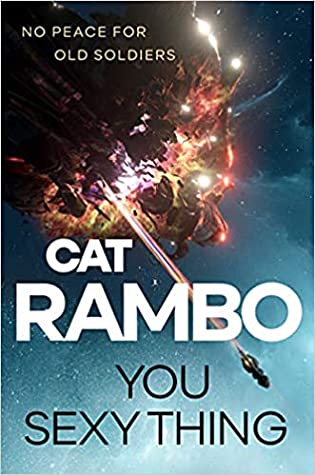 You Sexy Thing (Disco Space Opera #1) by
You Sexy Thing (Disco Space Opera #1) by  The Impossible Us by
The Impossible Us by